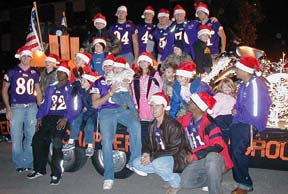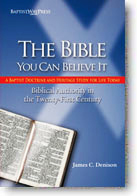Underwood urges Baylor graduates to challenge authority
Posted: 1/06/06
Underwood urges graduates
to think for themselves
By Ken Camp
Managing Editor
WACO–Bill Underwood ended his tenure as Baylor University's interim president by challenging graduates to think for themselves and respect the right of other people to disagree with them.
“You are entering a world where you will be discouraged–even repressed–from thinking for yourself,” he said. “You will be discouraged from challenging what you see, hear and read in the media. You will be discouraged from challenging political authority. You may well be accused of being unpatriotic if you do. You will be discouraged from challenging ecclesiastical authority. You may well be accused of being a heretic if you do.”
| Bill Underwood |
Underwood told the graduates at Baylor's December commencement ceremony they owe it to themselves not to give in to those who would deny their freedom of thought.
“Your responsibility to yourself demands that you not be discouraged from thinking for yourself. Your responsibility to yourself demands that you exercise your individual freedom of conscience. Let me go further. Let me suggest that your responsibility to others–to your community–demands that you exercise your freedom of conscience,” he said.
Underwood, president-elect of Mercer University, used his final address at Baylor to underscore themes of individual liberty of conscience and academic freedom–ideals many Baylor observers viewed Underwood as championing during the last turbulent years of Robert Sloan's tenure as university president. Those same issues also appear on the front burner at Mercer, which recently cut ties with the Georgia Baptist Convention.
“If we are to be a great Christian university, we cannot be afraid to pursue the course of truth, wherever that course might lead. Indeed, if our pursuit of truth leads us to question our existing view of God, it may just be that God is trying to tell us something,” said Underwood, who assumes the helm at Mercer July 1 after Kirby Godsey retires as president. John Lilley became Baylor's president Jan. 2.
Students attending Baylor these last few years had a ringside seat to observe a debate over the nature of Christian higher education, Underwood noted. He characterized the controversy as “a conversation among good people” about how truth is taught, about individual freedom of thought and about responsibility to the community.
“You have witnessed a conversation that has captured the attention of much of the Baylor community and even the world of Christian higher education–a conversation about two ideas that throughout history have been in endless antagonism,” he said.
Indeed, some of the graduates literally might have been in the audience more than a year before, when Underwood–then a law school professor–debated then-Provost David Lyle Jeffrey on the proper role of academic freedom in a religious university.
At the time, Underwood spoke against the evils of “autocratic dictates”–seen as a not-too-veiled reference to Sloan's and Jeffrey's interpretation of what it meant to integrate faith and academics.
In speaking to the Baylor graduates, Underwood quoted with alarm a statement by theologian and ethicist Stanley Hauerwas of Duke Divinity School: “No task is more important than for the church to take the Bible out of the hands of individual Christians in North America.”
Underwood underscored that view as consistent with the position of a “colleague here at Baylor” who “has described the idea that individual believers have the freedom to reach their own conclusions regarding the Scriptures as 'incoherent or simply a bad idea.'” Underwood later declined to name the person who made the statement, saying he wanted to focus on the ideas rather than the personalities.
Taken to its extreme in an academic setting, he noted, the same attitude prompted Adrian Rogers, a recently deceased leader among Southern Baptist fundamentalists whom Underwood also did not mention by name, to declare that teachers should be required to teach agreed-upon orthodoxy, “And if we tell them to teach that pickles have souls, then they must teach that pickles have souls.”
“Under this idea, we would have spiritual masters to tell us what to teach, what to learn and what to believe,” Underwood said, comparing that attitude to the scribes and Pharisees of Christ's day.
“God has given us the gift of reason,” he continued. “And Jesus commanded us to use our minds–to love God with our hearts and our souls–but also to love God with our minds. Surely, keeping this greatest of all commandments requires us to think for ourselves and come to our own conclusions.
“Indeed, when we stand before God on judgment day, it would hardly be a defense to say that we just believed as we were told. You see, we are responsible for our souls. It is this responsibility that requires us to think for ourselves and come to our own conclusions.”
Underwood disputed the criticism that commitment to individual freedom of conscience leads to cultural relativism and the belief that there is no objective truth.
“There is truth. There is right. There is wrong. And sometimes, we are wrong. Sometimes, our ideas are lousy and ought to be rejected by others,” he said. “Our great theologians are sometimes wrong. Our philosophers can be wrong. Even our university presidents are sometimes wrong.”
The awareness that no one possesses perfect knowledge should lead to a humble pursuit of truth, both by individuals and by Christian schools, Underwood said.
“This pursuit of truth requires exposing our students to the great thinkers of today and yesterday–not so that they will blindly accept the conclusions of others, but instead to aid them in their search for truth,” he said.
“Christian universities must also equip our students with the critical thinking skills needed for a lifelong pursuit of truth. This requires encouraging students to think for themselves and then to test their ideas in free and open discourse with others, even ideas that are controversial–even ideas that challenge prevailing viewpoints.”
Underwood challenged students to think for themselves and exercise their individual freedom of conscience, even if it means challenging prevailing wisdom. At one time, he noted, racial segregation was the “prevailing orthodoxy” in the South, and too few free thinkers challenged it.
“How many other beliefs at one time firmly held as true have been proven false with the passage of time? What so-called 'truths' that we hold dear today will the passage of time prove false? And how will we know if we accept what others have declared as orthodox without question?” he asked.
Repeating his charge to the graduates, Underwood closed: “Use the intellect that God has given you. Think critically. Have courage. And acknowledge–no, embrace–the right of others to disagree.”
The full text of Underwood’s commencement address to Baylor graduates is located here.
 •
• 



